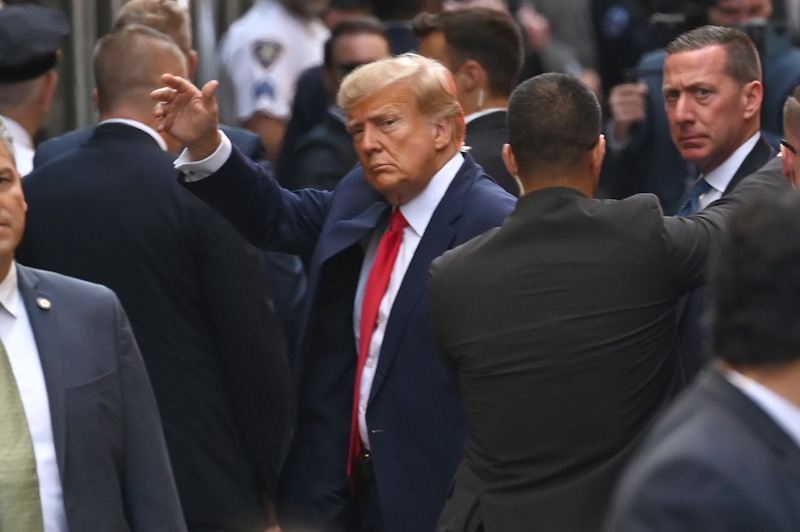Why Trump is charged with 34 counts of falsifying business records for one $130K hush-money payment

Former President Donald Trump is seen arriving April 4 at the New York City Criminal Court to be arraigned on charges related to a hush-money payment to an adult film actress during his 2016 presidential campaign. Photo by Anthony Behar/Sipa USA via the Associated Press.
Former President Donald Trump has been charged with 34 felony counts of falsifying business records as part of an alleged scheme to influence the 2016 presidential election and mischaracterize payments for tax purposes.
The 34 counts are based on a series of payments allegedly made by Trump and his trust to reimburse lawyer Michael Cohen and make him whole for paying $130,000 in hush money to adult film actress Stormy Daniels, who claimed she had an affair with Trump, according to the New York Times.
Trump pleaded not guilty at his arraignment Tuesday. He has also denied the affair.
The indictment alleges that the payments, which were mischaracterized as Cohen’s legal fees, violated election laws. New York law says records violations are misdemeanors—unless the false record is made with the intent to cover up another crime.
The counts are based on allegedly false record entries made for 12 monthly payments of $35,000 made to Cohen in 2017, according to a statement of facts. The $420,000 covered the $130,000 hush-money payment and another expense of $50,000, for a total of $180,000, according to the statement of facts. The money was then doubled to account for income taxes that Cohen would have to pay on the money. An additional $60,000 was added as a bonus.
The nature of a Feb. 14, 2017, payment, for example, was obscured by a phony invoice, two false entries in the detail general ledger, a check and a check stub, the indictment says. This conduct accounted for four counts of falsifying records in the first degree.
Even though the false-records counts are based on the payments to Cohen concerning Daniels, the statement of facts detailed a larger alleged scheme involving American Media Inc., which publishes the National Enquirer.
Cohen served prison time after pleading guilty to campaign violations for making the payment to Daniels. American Media Inc. admitted in a nonprosecution agreement that it made a payment to a second person to ensure that she did not publicize damaging allegations about Trump.
The second person was apparently former Playboy model Karen McDougal, who received $150,000 from American Media Inc. According to the indictment’s statement of facts, Cohen discussed how to reimburse American Media Inc. for the money in a recorded conversation with Trump. The reimbursement never took place.
The statement of facts also said Cohen discussed the payment to Daniels with Trump and the Trump Organization’s chief financial officer. Cohen agreed to make the payment after discussing options with the CFO, Allen Weisselberg. But he also confirmed with Trump that he would be paid back, according to the allegations.
Cohen made the hush-money payment by opening a bank account in the name of a shell company called Essential Consultants, transferring money into the account from his personal home equity line of credit, and then transferring the money to Daniels’ lawyer.
The first reimbursement checks to Cohen were paid by Trump’s trust, but later checks were paid by Trump personally and signed by Trump, according to the statement of facts.
See also:
ABAJournal.com: “What will the grand jury indictment mean for Trump?”
ABAJournal.com: “Meet Joseph Tacopina, the outspoken lawyer defending Trump in ‘political prosecution’”
ABAJournal.com: “Experts see these problems with felony-records case against Trump over hush-money payments”
ABAJournal.com: “Cadwalader partner reportedly resigns to lead Trump’s representation in Manhattan DA’s criminal case”



